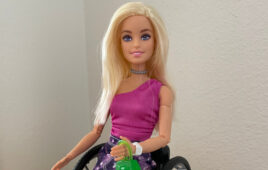 A new national report describes in micro and macro detail the many caregiving-related challenges faced by people living with spinal muscular atrophy (SMA).
A new national report describes in micro and macro detail the many caregiving-related challenges faced by people living with spinal muscular atrophy (SMA).
“Stuck Inside: A National Report on Caregiving for Individuals with Spinal Muscular Atrophy” was released by Cure SMA on Feb. 16, which was National Caregivers Day in the United States.
SMA is a genetic, progressive neurodegenerative disease that affects voluntary muscle movement, impacting functions such as breathing, walking, talking, and eating.
MRADLs are among caregiving tasks performed
The report was presented by Cure SMA President Kenneth Hobby and VP of Policy & Advocacy Maynard Friesz. Cure SMA is headquartered in Elk Grove Village, Ill.
“The report includes numerous first-person quotes from adults with SMA and family caregivers that were collected from surveys and interviews,” Hobby and Friesz said. “The SMA community’s goal in sharing their experiences is to educate state and federal policy-makers about the caregiving needs and challenges they face and to offer practical steps government leaders could take to reduce the caregiver barriers of people with SMA and other disabilities in the United States.”
People with SMA who contributed to the report said they typically each need one to three caregivers who provide more than 100 hours of caregiving support every week. “Top caregiving duties include transfers in and out of bed and into their power wheelchair, bathroom support, and household duties, such as laundry, shopping, and light housekeeping,” the report said.
Despite this reliance on caregiving assistance, people with SMA often struggle to find appropriate support, the study noted. “Individuals with SMA face confusion over what state programs exist that they may quality for, receive a fraction of the Medicaid caregiving hours they need, and have difficulty in finding and retaining caregivers,” the report said. “On top of those problems, they also fear that their only backup support, usually an unpaid loved one, can no longer help.”
People with SMA reported needing caregiving assistance for a range of daily activities, including many mobility-related activities of daily living. For example, 83% of study respondents reported needing assistance for food preparation, and 79% said they needed help with dressing and grooming. Respondents also commonly reported needing caregiver help to transfer in and out of wheelchairs (79%) and beds (75%).
Family members bear half of caregiving load
The report said about half of the more than 100 hours of caregiving per week is paid for by Medicaid or another funding source, but the other half of the support is unpaid and provided by family caregivers. “State Medicaid agencies typically approve fewer caregiving hours for an individual with SMA than what that person requires to maintain their health and independence,” the report said.
The report also includes many personal experiences shared by people with SMA. A woman in Florida who has SMA described asking Medicaid for more caregiving help. “In my appeal letter, I pointed out that no human goes to the restroom only morning and night,” she explained.
She won her appeal, but still was only able to get limited additional assistance mid-day. “Now I can use the restroom a whopping three times a day,” she said.
The report suggested solutions including improved, more accessible online information on caregiving options; changing eligibility requirements for caregiving support to eliminate or significantly increase income and asset limits; Medicaid coverage portability for people with SMA who move to other states; and strengthening the caregiver workforce by offering better wages, benefits, training, and opportunities to grow.

